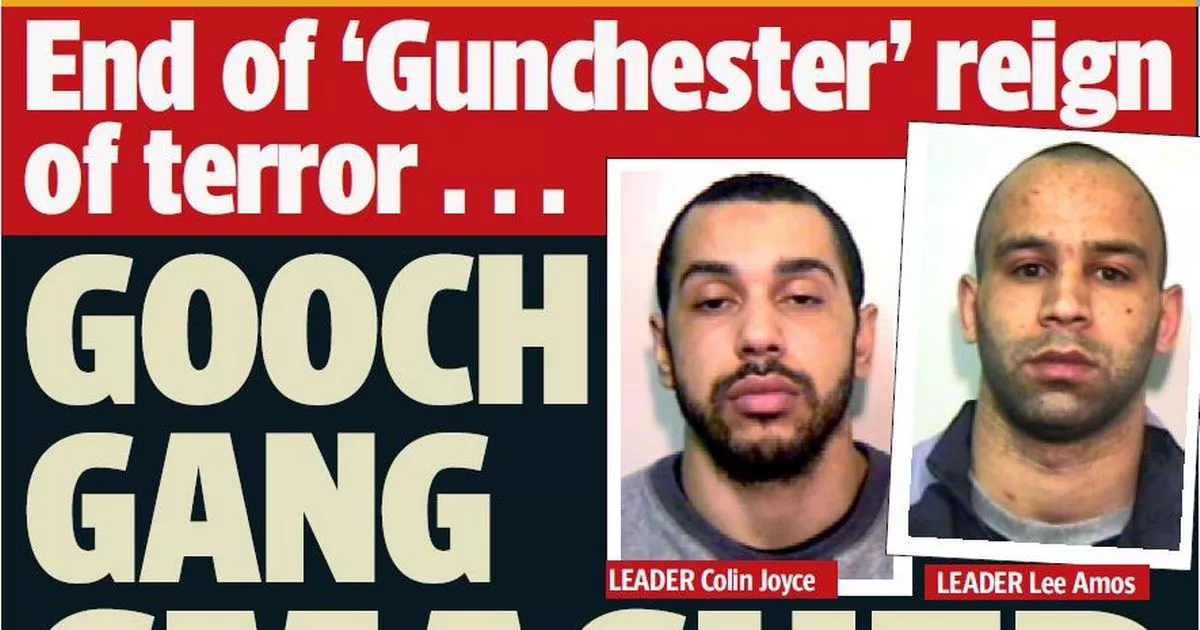The evidence of six former Gooch Gang associates was crucial in bringing Lee Amos and Colin Joyce to justice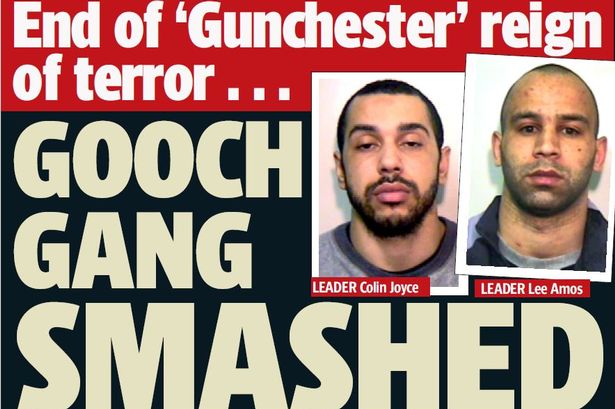 How the Manchester Evening News reported the convictions of Colin Joyce and Lee Amos
How the Manchester Evening News reported the convictions of Colin Joyce and Lee Amos
It was one of the biggest gangland trials in UK history.
Colin Joyce, Lee Amos and several other members of the infamous Gooch Gang stood accused of crimes ranging from firearm possession to murder. But ensuring their convictions would very difficult without witnesses.
And in gang trials witnesses tend to be very hard to come by. Bound by a culture of silence or fearful of retribution, those with inside knowledge of the crimes or members of the public who have seen things they wished they hadn’t, are often reluctant to help police with their investigations.
But, when it came to the trial of Joyce, Amos and nine others for the 2007 murders of Tyrone Gilbert and Ucal Chin and a range of other gang-related offences, Greater Manchester Police had an ace up their sleeve. In fact they had half a dozen.
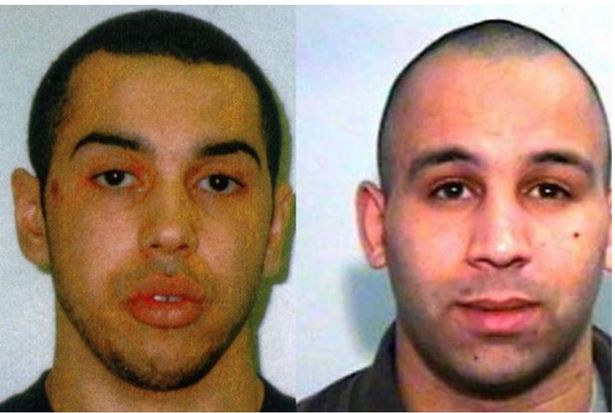 Colin Joyce and Lee Amos
Colin Joyce and Lee Amos
Six former associates of the gang had agreed to give evidence. In return they were given immunity from prosecution and placed in the witness protection programme.
That meant leaving behind family, friends and their homes while often assuming a new identity in a different part of the country. It was a drastic measure.
But as Det Chief Insp Janet Hudson told the documentary Bringing Down the Gooch, it was one that was justified in order to bring the killers to justice.
“We made a commitment to these witnesses that we would be with them throughout this trial and that we would be there basically 24 hours a day,” she said.
“Support ranged from going for a cup of tea with them, sitting with them, to full protected status where their identity has changed and they are they are moved away – whatever it was that they needed to help them through that stage.
Sign up to the MEN Court newsletter here
“This group of people had already killed two people and you can’t lose sight of that when you’re protecting your witnesses.”
As leaders of one of the city’s most feared gangs, Joyce and Amos, who an inquest heard last week died from a heart attack in prison aged 48, helped Manchester earn its unwanted nickname ‘Gunchester’ in the 2000s. Their crimes were once likened by a judge to the Al Capone-era of gangland violence in the US.
But as they stood in the dock at Liverpool Crown Court in 2009 their reign of terror was coming to an end. During the six month trial some of the witnesses admitted their own crimes.
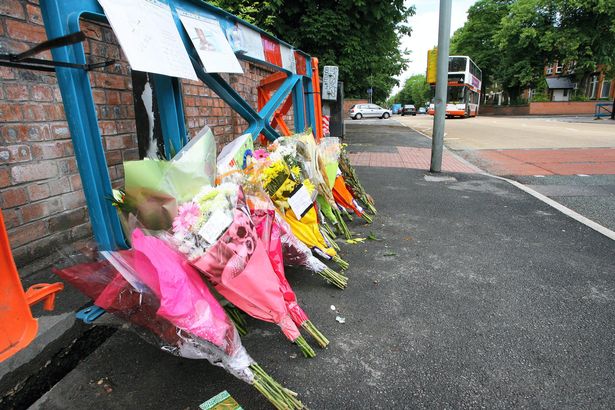 Flowers and tributes to Ucal Chin at the scene of his murder
Flowers and tributes to Ucal Chin at the scene of his murder
Giving evidence from behind screens in a court guarded by cops with machine guns, one told the jury he had sold drugs for the gang, but was tortured in a row over money. He was taken to a forest, tied to a tree, beaten unconscious and threatened with a gun while being warned ‘If you ever leave the gang, we will kill you’.
Another told police about gang members coming to their house to package drugs in their kitchen while another told how they’d been asked to store the Honda Legend car used in the drive-by shooting of Tyrone Gilbert in the days leading up to the murder and had later been ordered to burn the vehicle’s documents in an attempt to destroy evidence.
In April 2009 Amos and four other Gooch gang members were found guilty of killing 24-year-old Tyrone Gilbert at a wake in Longsight. Six weeks prior to Mr Gilbert’s funeral, Joyce had ‘executed’ the man for whom the wake was being held 23-year-old Ucal Chin, 23, in a daylight ambush.
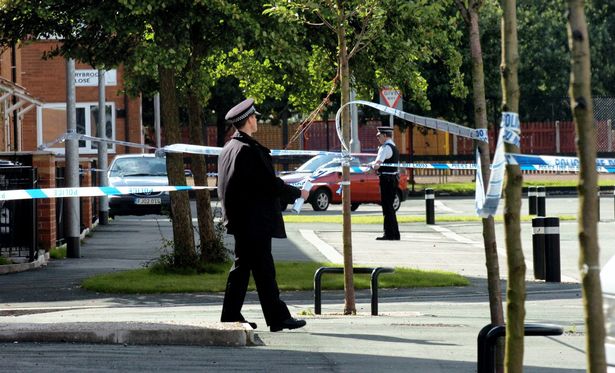 Police at the scene following the shooting of Tyrone Gilbert
Police at the scene following the shooting of Tyrone Gilbert
Joyce pulled up in an Audi and peppered Mr Chin’s car with 9mm bullets from a converted Russian Baikal self-loading pistol. Mr Chin was killed because Amos and Joyce believed he was a member of the Longsight Crew.
Amos was ordered to serve life with a minimum term of 35 years. Joyce was also jailed for Mr Gilbert’s murder and ordered to serve a minimum of 39 years. Manchester’s chief crown prosecutor John Holt hailed their conviction as having ‘enormous significance for public safety’.
‘End of ‘Gunchester’ reign of terror… Gooch Gang Smashed’ read the headline on that afternoon’s Manchester Evening News, as police revealed gun crime in the city had fallen 92 per cent since the arrests of Amos and Joyce.
Join our Court and Crime WhatsApp group HERE
But as the authorities celebrated, the witnesses who had helped bring down the Gooch were beginning new lives in new towns and cities. The following year one witness, going by the pseudonym Ian, told the Independent why he decided to give evidence.
“Moss Side was out of control,” he said. “I would see boys that looked as young as 12 using guns, shooting at each other. For them it was easy to pull the trigger. To them killing someone is easy, they do not care. So I told the police that the only way I would become a witness is if I was given a place to go, somewhere safe for me and my family.”
Ian described how, one morning in June 2007, he packed a single suitcase and left his home in Moss Side never to return. He told how none of his family knew why he left or where he had moved to.
“No one knows why I moved away and that is for my own safety,” he said. “I have a large family and if I tell someone things could be leaked. I cannot trust all of my family.
“When left I told them I was going on holiday, I have not seen any of them since, but I have spoken to my mother and my brother on the phone. All I have told them is that after the holiday I decided to move away.
“I do miss my mother and I feel bad that I cannot tell her where I am, but she has not complained. She had just said ‘good luck’. She has asked where I am and I have said when the time comes I will tell her. At the moment I cannot see a day when I will tell them.”
It was a huge sacrifice. But Ian said, it was a choice he felt he had to make.
“I thought I should do it for the sake of improving the area,” he said. “If I became a witness I knew the place would get better. Sometimes you have got to sacrifice things for other people. I never regret it because I think I have probably saved someone’s life.
“I think it would be very difficult for them to find me. It is a big country so I just have to hope that they never find me.”
